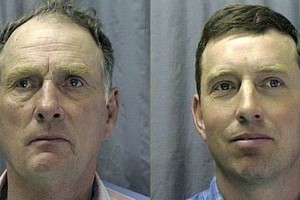
Judge To Rule On Grazing Allowance For Family Whose Case Sparked Malheur Occupation
Read On
After hours of testimony, a federal judge in Portland extended a temporary restraining order as he considers whether or not to prevent a controversial Harney County ranching family from grazing their cattle on certain parcels of public land in southeast Oregon.
On Friday, U.S. District Court Judge Michael Simon granted the extension to allow for more evidence. After that, he said he would rule on whether to not to grant a preliminary injunction, a more permanent decision that would stay in place until the case is resolved.
In May, a trio of environmental groups sued the Bureau of Land Management. They’re trying to prevent the federal government from allowing the Hammond family from grazing cattle on what the environmental groups argue is sensitive lands for sage grouse and redband trout.

Protesters object to the sentencing of Oregon ranchers Dwight and Steven Hammond during a rally in Burns, Oregon, on June 2, 2016. CREDIT: AMELIA TEMPLETON/OPB
The Hammonds and their run ins with federal officials were at the center of the 2016 occupation of the Malheur National Wildlife Refuge. In 2012, Dwight and Steven Hammond were convicted of arson on public lands. Standoff leaders cited their punishments in that case as the reason for the refuge takeover. President Donald Trump pardoned the Hammonds a year ago, and Interior Secretary Ryan Zinke restored their grazing permits on his way out of office in January.
The order granted the Hammonds, prominent in the Harney County ranching community, the ability to graze cattle on 26,000 acres of federal land.
As part of the lawsuit, Wildearth Guardians, the Western Watersheds Project, and the Center for Biological Diversity raised concerns not only about the environmental effects of grazing cattle, but also laid out past abuses on public lands committed by the Hammond family.
Earlier Friday, the federal government floated a proposal that would allow for a mix of grazing and conservation on some of the land discussed in the lawsuit.
Simon encouraged the two sides to come to an agreement.
“If you’re both moderately unhappy that’s generally a good sign,” Simon said.
But an attorney representing the environmental groups declined the offer and instead pushed for a preliminary injunction.
Hours of testimony from experts followed on the subjects of sage grouse “leks” used for mating, native grasses, sage brush, cheat grass, wildfire and riparian zones.
Clait Braun, a sage grouse expert, testified about the negative impacts of cattle grazing on the sage grouse habitat. He said it will take 40 to 60 years for some of the land the Hammonds want to graze to recover from previous grazing.
“Resuming grazing would make the issue worse,” Braun said.
In order to grant a preliminary injunction the environmental groups must prove grazing catting on certain public lands near Steens Mountain will cause “irreparable harm.”
The U.S. Department of Justice, which is representing the BLM, said the environmental groups don’t have a strong enough argument for Simon to make that finding.
Copyright 2019 Oregon Public Broadcasting
Related Stories:

Repentina suspensión de Head Start afecta a cientos de niños en el centro de Washington
Suspensión de los programas Early Head Start y Head Start afecta a siete Inspire Development Centers en el centro de Washington, dejando a más de 400 niños sin apoyo educativo después de que la financiación federal nunca llegara. También provocó el despido de más de 70 personas.

Idaho Gave Families $50M to Spend on Private Education. Then It Ended a $30M Program Used by Public School Families.
Just weeks after creating a $50 million tax credit to help families pay for private school tuition and homeschooling, Idaho has shut down a program that helped tens of thousands of public school students pay for laptops, school supplies, tutoring and other educational expenses.

Hundreds of children affected by sudden Head Start closures in Central Washington
More than 400 children in Central Washington are without educational support services after federal funding did not arrive. Dozens of staff members were also dismissed.













